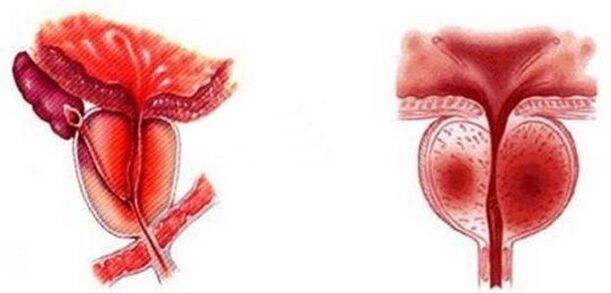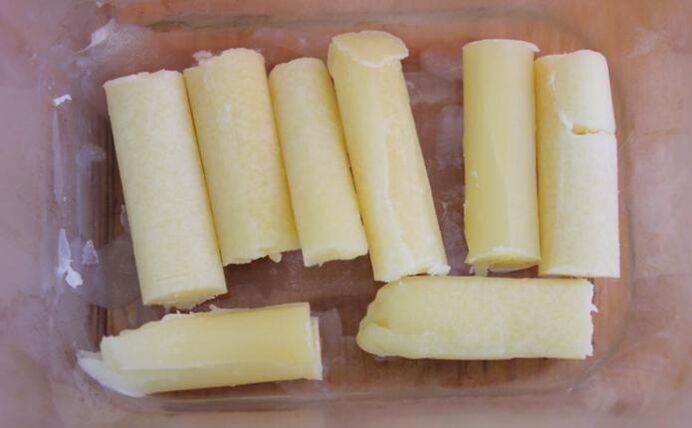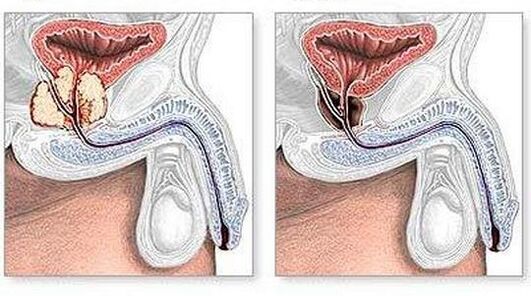
Chronic prostatitis (MKB-10. N41,1) is called an inflammatory process, which is observed for more than three months in the tissues of the prostate.It is characterized by the fact that in almost 70% of cases, it occurs without symptoms.And only 15% of patients complain of manifestations of the disease.All other people have symptoms that only partially indicate the development of prostatitis and can often contact other diseases.Therefore, it is so important for any sign to be a doctor who tells you how to treat chronic prostatitis after the examination.
A peculiarity of illness
Chronic prostatitis can not only be diagnosed with older people.The people of young and middle people are also subjected to the disease.Those who live a sedentary lifestyle, follow sexual abstinence, or experience physical effort in the perineum.That is, the likelihood of chronic prostatitis in drivers, athletes are much higher than everyone else.
Of all the diseases of the male reproductive system, chronic prostatitis takes first place in prevalence, followed by cancer and benign hyperplasia (prostate adenoma) of the DGPG prostate gland.About one in three people are confronted with prostate inflammation and one in five suffers from the chronic form of the disease.
In most cases, the cause of chronic prostatitis is the transitional disease of infections caused by infections.Less often, this is caused by inflammatory processes related to the change in human hormonal background.
Classification
Like other inflammatory diseases, chronic prostatitis can be an acute and chronic stage.Classification is based on the following features:
- The presence of leukocytes in the urine.
- The presence of pathogenic bacteria in urine, ejaculation or the secret of the gland.
Based on classification, the following type of disease exists:
- Symptomatic inflammatory prostatitis is characterized by a lack of symptoms of chronic prostatitis.It is possible to randomly identify if the patient consults with any other disease.
- Acute bacterial prostatitis.The patient involves acute inflammation of the prostate tissues, and pathogens are present in the urine, leading to the increase in temperature and the development of body intoxication.
- Chronic bacterial prostatitis.The doctor notes the typical signs of chronic inflammation.And the high content of leukocytes and bacteria is detected in the analysis of urine and secret.
- Chronic pain syndrome in the pool.Such pain is considered to be the main symptom because the bacteria are not detected.To diagnose chronic prostatitis, the syndrome should be observed for at least 3 months.
The causes of illness
The main cause of chronic prostatitis is the penetration of pathogens (enterococci, intestinal or prayer sticks, etc.) into the prostate gland, etc.).Go to the prostate, bacteria can have three ways:
- Through the urethra.
- Through blood.
- Through the lymph.
According to statistics, 90% of the cases of chronic prostatitis are the result of acute prostatitis or uretritis complication.
In addition to entering the prostate of bacteria, the causes of chronic prostatitis may be as follows:
- Sexual Infections (STPP): Herpes, Trichomonas, Gonococcus, Chlamydia, etc.
- Stagnation processes in the pelvic area that can provoke prostate inflammation.
- Reducing immunity.This can lead to: vitamin deficiency, hormone balance, hypothermia, allergic reactions, significant physical and emotional stress, non -infected infections, etc.
- Sitting lifestyle.
- Light weight.
- Irregular sex life or disorders in the intimate sphere.
- Crotch injuries.
- Wearing a narrow canvas.
- Irrational nutrition (predominance of the diet of spicy food).
- Lining for urination.
- The president's violation.
This can lead to circulatory disorders in the pool area, contribute to stagnant phenomena and the development of the inflammatory process.The result of the lack of therapy is infertility and impotence.
The symptoms of the disease
Signs of chronic prostatitis can be very different.Most often the patient complains:
- Reducing power.
- Fast fatigue.
- Increased irritability.
- Anxiety.
- Sleep violation.
- Lethargy.
- Loss of appetite.
- Increased sweating.
Among the local symptoms:
- Urine disorder.The patient feels frequent urgent and pain at the beginning and end of urination.
- Painful pain that can add to the groin, the sacrum, the scrotum, the sub -lane bone or the rectum.
- Pain for sex.
- Empty the tension of the pelvic muscles.
Unlike acute phase, chronic disease often occurs in violation of sexual functions.This is related to the fact that stagnant inflammatory processes also affect the nerve endings that ensure the spread of impulses to the brain.As a result, an erection violation is possible, which weakens or ejaculation (premature ejaculation), and feelings during orgasm (deleted orgasm) are boring.Such symptoms of chronic prostatitis in men lead to proximity, irritability, and as a result of fear.
It is not easy to treat chronic prostatitis.How long the medicines should be taken depends on the degree of pathology and the duration of the disease.It is important to note that if the symptoms of the disease have disappeared, this does not mean the final cure.The serious consequences of chronic prostatitis include the scarring of the gland.This process can switch to the urethra.
Diagnosis of the disease
When he goes to a doctor, he asks the patient with the symptoms available.Particular attention is paid to the frequency and nature of pain, the impaired urination, and the sexual dysfunction.But due to the fact that chronic prostatitis can occur without any manifestation, some tests are needed:
- We determine the clinical and bacterial urine analysis, which determines the amount of leukocytes and the presence of pathogenic microorganisms.
- Analysis of the secret containing bacteria.
- Scraping of the mucous membrane, which determines the amount of leukocytes, the presence of macrophages and amyloid bodies.
- Transuretral ultrasound allows the echobroblast of chronic prostatitis and the determination of the state of the prostate.
A high -quality diagnosis is a significant part of proper treatment as it allows chronic prostatitis to distinguish from other pathologies with similar symptoms.
Treatment
This disease should have an integrated approach to therapy.In this case, the patient should be tuned in.The treatment of chronic prostatitis will be individual in all patients.Usually the patient does not need hospital care and can be treated at home.A completely different issue is when the acute phase of the disease or its aggravation is subject to treatment against the background of chronic inflammation of the prostate.Antibacterial therapy is used in the hospital and is performed in a deinoxic way.If necessary, an operation is required.
Medication
For comprehensive treatment of chronic prostatitis, medicines are prescribed to eliminate infection, normalize blood circulation and the levels of hormones.Use to do this:
- Antibiotics.
- Anti -inflammatory, non -steroidal drugs.
- Anticholinergic agents.
- Immunomodulators.
- Angioprotectors.
- Vasodilarative drugs.
Before starting the meeting, the doctor analyzes the pathogen.If the disease is not the origin of a bacterium, the antibiotic treatment will be short.In the event that it cannot be determined by pathological microflora laboratory methods, we use histological analysis of the prostate tissue.
Antibacterial therapy is prescribed for prevention by relapse.For this, a drug is used that has been used during treatment, but at a lower dose.
Knowing what is chronic prostatitis and what can cause its development, the specialist will pay attention to the ability of the prostate to the ability of the prostate and to reduce it.If this function is reduced, inflammation of stagnant phenomena and prostate may occur in the pool.Alpha blockers are prescribed to normalize intrauterine pressure.
You can avoid painful injections and taking tablets using a candle.
Non-steroidal anti-inflammatory drugs are used for rapid and painful urination complaints, along with alpha blockers.
They have been ineffective when taking antibiotics, and the symptoms, such as pain and dysuria, are adjusted to treat the following:
- Eliminating pain.To do this, use tricycle antidepressants.
- Normalization of urination.Treatment is prescribed after Hurinodynamic Analysis.With the hyperactivity of the sphincter, antihistamines, tricycle antidepressants and bladder rinse are indicated by antiseptic solutions.Neuromodulation and physiotherapy are used with the effectiveness of such treatment.
No -drog methods
In order to make the treatment with tablets more effective, the physician may recommend physiotherapy (electrophoresis, phonophoresis, laser therapy, mud treatment) and transrectal hyperthermia, taking into account existing changes in prostate and related disease tissues.If they are exposed to 40 degrees, the cell immunity is activated.When exposed to 45 degrees, nerve endings are inhibited, which promotes pain to stop.The use of laser therapy has a biostimulatory effect.
In the absence of contraindications, the patient is performed by the prostate gland.Often patients are prescribed psychotherapy and special exercises that can strengthen the perineum muscles.
Treatment with folk medicine
Together with the use of drugs, the manifestations of chronic prostatitis are treated by folk methods.Such treatment increases immunity and reduces pain.For this, herbs, baths, etc.It is also used outside its infusion and decoctions.
Treatment with phytopreterations is at least 1 month and should be prescribed by a doctor as some may be contraindicated.Treatment with folk methods suggests:
- Abundant drink (teas with Linden, lace, raspberries).
- Every day before meals, drink 1 glass of freshly pressed juice, pears, cucumbers.
- If the patient is caused by pain, coniferous baths are used, 37 degrees.The procedure duration is 20 minutes.
- If the patient has no allergies to honey, it is advisable to eat 100 grams a day.
- At home, you can make suppositories on your own based on propolis or honey.You have to do them within 1 month.To prepare the candles, take the mixture of glycerol, gelatin and water in a 5: 1: 2 mixture.Add a propolis and divide the mixture to the parchment.Place everything in the refrigerator where the suppositories are completely frozen.
- It is recommended to make an enema from the worm before going to bed.To do this, 1 teaspoon of dry plant is cooked in 1 liter of boiling water.

Treatment of pumpkin seeds, aloe juice, parsley, chestnut and celandine can also be considered effective.Parsley has an anti -inflammatory effect and is able to restore sexual function.Fitotherapists recommend this treatment with this plant:
- Drink 1 tablespoon of parsley every day before meals.
- 4 teaspoons of vegetable seeds pour 250 ml of boiling water and insisted on the thermos overnight.The next day they drink 1 tablespoon of infusion per hour.
- The crushed root of the plant is poured into a 100 g root of 1 liter, a slow fire and cook for 10 minutes.The decoction is drunk during the day.
The effective tool is pumpkin seeds.About 30 such seeds contain daily doses of zinc, which is needed for the male health.You can make such a device for treatment.500 g of pumpkin seeds are crushed in a meat grinder and mixed with 200 grams of natural honey.The balls are made from the mass obtained, the size of the nuts.Every day you have to eat 2 such balls.
Propolis helps to strengthen body protection and relieve inflammation.You can buy its tincture at a pharmacy.For the treatment, drink a glass of milk daily with 1 teaspoon with such tincture.
In addition, liquorice decoctions, St. John's beer, Echinacea are used for treatment, which is also used in cases where the disease occurs without obvious symptoms.
Surgery
Chronic prostatitis often does not give symptoms, and patients seek medical help when the prostate gland has occurred and chronic prostatitis is already helpless.In addition, such complications can pose a risk to the patient's health.An example of complication can be called prostate sclerosis.
Due to the fact that such complications are often discovered in young men, doctors use minimally invasive surgery.Indication of its use: fimosis, involuntary urine emissions, or vice versa, delay, prostate abscess, significant increase in the size of the gland, urethral blockade or bleeding.There are surgical interventions indicated for chronic inflammation:
- Circular incision - if the patient has fimosis.During surgery, the foreskin is dissected.
- Prostatectomy is a radical operation in which the prostate is completely removed.It is carried out in the event of a suspicion of the presence of a malignant tumor.
- Prostate resection is partial removal of the gland and sclerotic change.
- Eliminating traction.
- Drainage of cyst or abscess.It is produced with endoscopy.For drainage, a special tube is used with a camera at the end.Such a device is introduced into the urethra lumen and allowed to check the direction of the operation.
- In the case of complaints of various sexual disorders (orgasm violation, painful ejaculation, etc.), the patient is carried out by incision of the eritarmal wires.

The result of surgical intervention depends on the timeliness of the diagnosis.In cases where there is a prostate adenoma, the manifestation of chronic prostatitis can be lubricated.This is observed in 70% of cases.25% of men learn the development of chronic prostatitis during adenoma.And only 5 % of patients - during preventive examination.
The requirement is a lack of effect on conservative treatment of the disease.Therefore, it is necessary to prevent complications and improve quality of life.
However, keep in mind that even after surgery, it is possible to return to prostatitis.This happens in almost half of the functional.Contraindication of any operation:
- Diabetes.
- Pathology of the liver.
- Respiratory disease.
- Mental disorders.
- Heart disease.
The prognosis of the disease
Anyone who face such a diagnosis is interested in the cure for chronic prostatitis?The disease is considered to be healing if the symptoms have not appeared for a significant duration, the levels of leukocytes in the urine are normal, the prostate secret has no pathogenic bacteria, urination and sexual function restored.
Most often, the prognosis is favorable in cases where the disease has not led to irreversible processes and the patient observes the treatment it prescribes.
Preventing the disease
Each middle person must prevent the prevention of diseases of the genitourinary system, which also facilitates reducing the likelihood of chronic prostatitis.Enough for this:
- Keep the basics of a healthy lifestyle and exercise.
- Eat well.It is important to consume a lot of protein content (low fat meat and fish, dairy products, eggs) and limit the amount of animal fats.At the same time, the canned foods, alcohol and alcohol should be excluded from the menu.
- Regular sex life.It is important to avoid unprotected sex.
To prevent prostate disease, all people, especially after 35 years, should monitor health and live an active life.You do not need to ignore the medical examination, which always helps prostate to identify and start treating it in time.It is important to note that it is healing when it is detected in the initial stages and the patient observes the prescriptions of all doctors.























